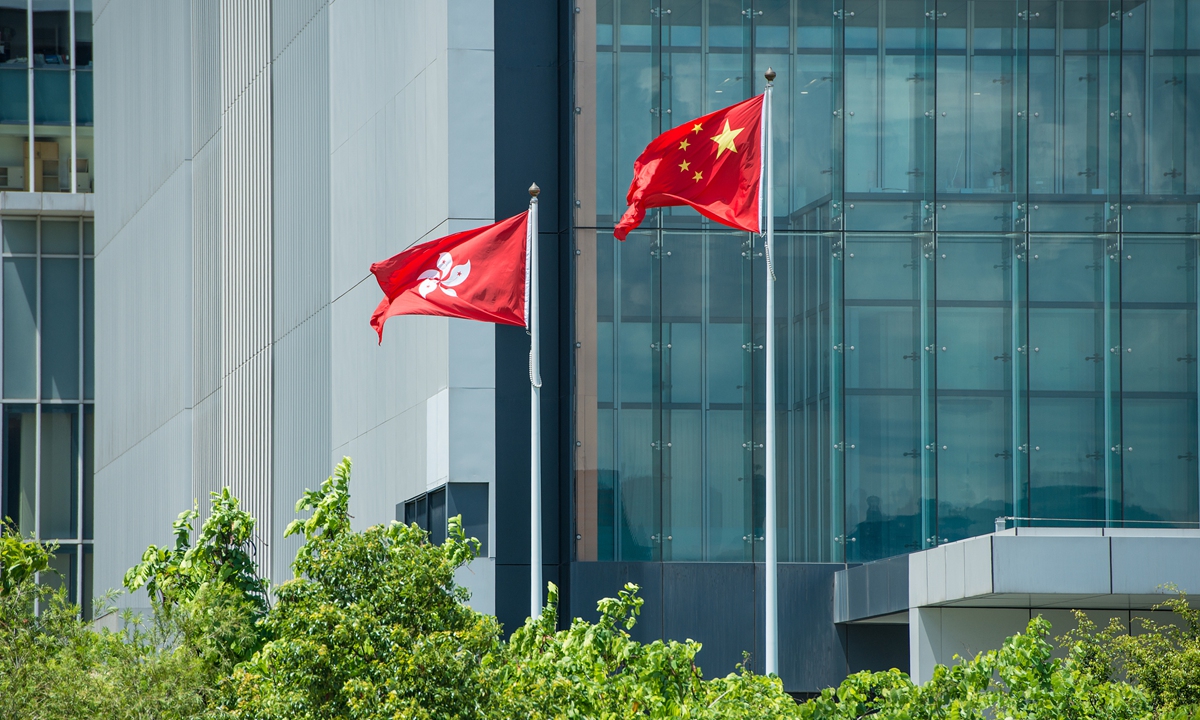HK has never adopted Western 'separation of powers' concept: State Council
Source: Global Times Published: 2020/9/7 23:57:14

Hong Kong Photo:VCG
Hong Kong Chief Executive Carrie Lam said on Tuesday that the disputes among society over the "separation of three powers" showed the misunderstanding of the Hong Kong Special Administrative Region's (HKSAR) political system under the framework of "one country, two systems," and she hopes people can learn about the facts through the debates.
The reasons for the disputes could be multiple, like a shortage of publicity and education, which could be improved in the future, but at the same time, some people would love to use these issues to create confrontations and problems, said Lam at a press briefing on Tuesday.
The facts are clear - the HKSAR political system is executive-led with the chief executive at its core. Hopefully, society can deepen its understanding of the topic, and educate the next generation, she noted.
Saying the HKSAR adopted "separation of powers" is wrong and should be corrected, and such power structure has never existed in the city, said the Hong Kong and Macao Affairs Office of the State Council, after discussion of the topic was fanned by some controversial textbooks recently.
According to China's Constitution and the Basic Law of the HKSAR, Hong Kong is a local administrative region directly under the central government's jurisdiction. As far as its political system is concerned, it is a local political system, said the office via a spokesperson, noting that the high degree of autonomy enjoyed by the city, including executive power, legislative power, and judicial power, is granted by the central government. Certain powers that reflect national sovereignty are still retained by the central government.
The office said that even if the powers granted to Hong Kong are exercised, they are subject to the constraints and supervision of the central government. For example, laws enacted by the LegCo must be reported to the Standing Committee of the National People's Congress for filing and review.
"Separation of powers" as a political system model has a specific meaning. The constitutional status of the HKSAR determines that its political system should not be simply compared with a sovereign country, nor can it implement the "separation of powers" based on the complete power of a sovereign country. "Separation of powers" has never existed in Hong Kong, according to the office.
The office's response came after Hong Kong's education bureau called in August to make revision to local textbooks, including clarifications that Hong Kong's political system is not based on the so-called "separation of the three powers."
The decision soon sparked controversy as some questioned if the notion has been misunderstood by the central government.
Carrie Lam also said in late August that Hong Kong's high degree of autonomy came from authorization from the central government, and the chief executive is responsible to both the central government and the special administrative region.
Hong Kong has no "separation of powers," and a high degree of autonomy does not equate to full autonomy, according to Lam.
Separation of powers is a centuries-old Western construct of government that puts separate powers in the hands of the executive, legislative, and judiciary organs to ensure that no one branch is more powerful than another.
The spokesperson of the office emphasized that not engaging in the "separation of powers" is an important guiding concept in the drafting of the Basic Law.
When late leader Deng Xiaoping met with members drafting the Basic Law of Hong Kong in April 1987, he stated clearly: "Hong Kong's system cannot be completely Westernized, nor can it be copied from the West. Hong Kong does not implement the British system or the American system… We must be realistic and base it on our own characteristics. Decide your own system and management style." It can be seen that the issue of Hong Kong's political system not implementing "separation of powers" has actually been concluded long ago, said the spokesperson from the office.
The spokesperson pointed out that the political system of the HKSAR is characterized by an executive leadership with the Chief Executive at the core, and the Chief Executive reports to the central government on behalf of the HKSAR.
The implementation of executive leadership in Hong Kong does not deny the separation of powers between the executive, legislative, and judiciary organs, nor does it deny the existence of checks and balances between the executive and legislature, nor does it deny the independence of the judiciary.
Some people in Hong Kong deliberately confuse the audience and are keen to advocate the argument of "separation of powers." Their true intention is to expand legislative and judicial powers, weaken the governing authority of the Chief Executive, and resist the central government's management of Hong Kong, then to challenge the constitutional order of the HKSAR and turn Hong Kong into an independent political entity separate from the central governance.
It is now necessary to clean up the source, set things straight, and correct the reversed right and wrong, said the spokesperson.
Posted in: HK/MACAO/TAIWAN